Advanced Reconstruction Techniques for MRI
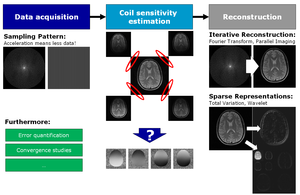
Magnetic Resonance Imaging (MRI) is a powerful medical imaging modality that provides a detailed soft tissue contrast. In contrast to computed tomography (CT), the patient is not exposed to radiation during the examination. Recently, methods to speed up image acquisition were proposed that apply iterative reconstruction techniques like compressed sensing to maintain image quality.
In this seminar we will discuss current methods, challenges and promising applications in MR imaging.
The goal of this seminar is to discuss and compare different approaches in the literature. You have the opportunity to implement and evaluate ideas and methods within an MRI reconstruction framework that is currently being developed by the MRI group at the Pattern Recognition Lab (LME).
The reconstruction framework provides modular components for the imaging pipeline, ranging from image acquisition to different reconstruction techniques.
The seminar will cover the following aspects:
- MRI simulation and data acquisition schemes
- Iterative reconstruction techniques
- Sparse image representations (Wavelets, Total Variation)
- GPU acceleration / parallelization of performance-critical tasks
Development of algorithms plays an important role in this seminar. Thus, participants should have established programming skills in C++ and/or Matlab.
Furthermore, it is advantageous for participants to have attended lectures on image processing or pattern recognition.
An introduction into the software framework and MRI basics will be given at the beginning of the seminar.
Organization
This is a seminar for Bachelor/Master students (4 SWS / 5 ECTS).
A good command of Matlab and/or C++ is expected from the participants.
The first topics are assigned in the kickoff meeting on Wednesday, October 19th. Additional topics are announced after the summer holidays, in the first week of the winter term. Please contact us by mail at mrseminar(at)i5.informatik.uni-erlangen.de if you want to join.
Shortcut to this website: tinyurl.com/MRSeminar2011
Meetings
| Date | Agenda | Place |
|---|---|---|
| 27/07/11 | Kickoff meeting | 14:30 in room 09.150 |
| 16/11/11 | Assignment of remaining topics | 15:00 in 09.150 |
| 23/11/11 | MR fundamentals | 15:00 in 09.150 |
| 30/11/11 | Solution to exercises | |
| 05/12/11 | Draft of presentation is due! | |
| 07/12/11 | Presentations I | |
| 14/12/11 | Presentations II | |
| 21/12/11 | Project briefing | |
| 28/12/11 | (Christmas break) Work on project | |
| 04/01/12 | (Christmas break) Work on project | |
| 11/01/12 | Work on project | |
| 18/01/12 | Work on project | |
| 25/01/12 | Final Presentations I | |
01/02/12 | Final Presentations II |
Resources:
Material for project "MR basics"
![]() Data.zip - updated 25.11.2011!
Data.zip - updated 25.11.2011!
Contact
Registration/Infos/Updates: mrseminar(at)i5.informatik.uni-erlangen.de
| Christoph Forman: | christoph.forman(at)informatik.uni-erlangen.de |
| Robert Grimm: | robert.grimm(at)informatik.uni-erlangen.de |
| Jana Hutter: | jana.hutter(at)informatik.uni-erlangen.de |
Projects
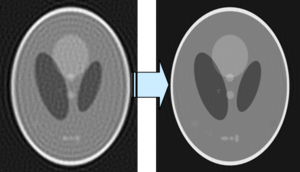
Topic 1: Compressed Sensing MRI
Compressed Sensing (CS) algorithms are a powerful family of iterative reconstruction techniques that exploit sparsity in a certain transform domain.
Tasks:
- Literature research on CS.
- Implementation (Matlab/C++) of one CS algorithm within the provided Framework (e.g. ISTA-type).
- Comparison against other, already implemented algorithms.
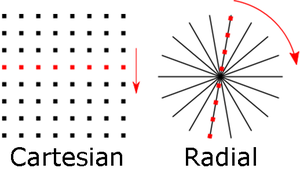
Topic 2: Radial Sampling
Radial trajectories are a recent trend in MRI but require a non-uniform FFT for reconstruction. Therefore, iterative reconstruction algorithms sometimes simulate the trajectory by interpolation onto a Cartesian grid.
Tasks:
- Study noise tolerance of radial trajectories vs. cartesian trajectories.
- Examine whether pseudo-radial sampling has a similar artifact behaviour as true radial sampling.
- Implementation: preferrably C++
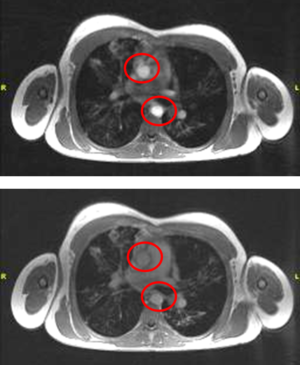
Topic 3: Prior image regularization
Especially in dynamic imaging, the difference to a prior image is sometimes used for regularization. The same methods can be used to evaluate quality if a reference image is available. An interesting use case are contrast enhanced examinations, where the perfusion can be assessed by injecting contrast agent.
Tasks:
- C++ Implementation of a prior image constraint (L1/L2/local).
- Evaluation of the new regularization term.
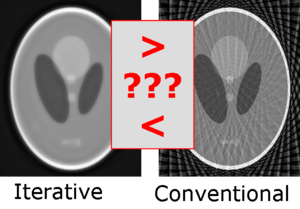
Topic 4: Image quality measures
Image quality measures are essential to assess and compare e.g. the results of different reconstruction algorithms. Some standard measures can be applied readily also for MR imaging. Others - like signal-to-noise ratio - can not be transferred directly, especially for the case of parallel MR imaging.
Tasks:
- Literature research on quality measures.
- Implementation (Matlab/C++) of promising quality measures.
- Evaluation and discussion of advantages/disadvantages of the implemented measures.
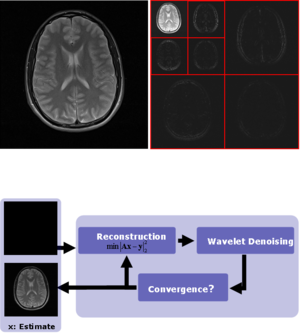
Topic 5: Image Denoising
Wavelets are used for image denoising. The procedure is described as follows:
- Wavelet transform
- Select appropriate threshold limit and apply it on wavelet coefficients.
- Inverse Wavelet transform
Undersampling k-space result in similar patterns as noise in the reconstructed images.
Tasks:
- Literature research on Wavelet denoising.
- Implementation of Wavelet denoising within the provided Framework.
- Application of image denoising in iterative reconstruction as described in Figure:
Iterative reconstruction runs x iterations, apply image denoising and restart iterative reconstrction with denoised image. Repeat until convergence.
Topic 6: GPU Acceleration
Iterative reconstruction in MRI require an immense computing power of the reconstruction system: In each iteration step Fourier transform and multiplication with coil profiles has to be applied. Parallel computing, such as GPU implementations, propose to accelerate computation times for iterative reconstrcution.
Tasks:
- Perform a software performance analysis.
- Implementation of provided algorithms in CUDA.
- Provide an interface to the framework.
- Compare the software performance of GPU accelerated implementation to provided implementation.
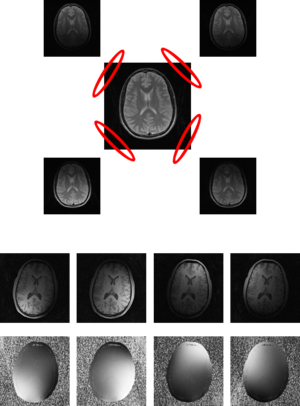
Topic 7: Coil Sensitivity Profile Estimation
Parallel imaging algorithms, such as SENSE, require known sensitivity profiles of the local coils.
Commonly they are estimated based on a low resolution scan prior to the actual scan and then filtered.
The quality of the estimated coil profiles has significant influence on the resulting image quality of the iterative reconstructions.
Tasks:
- Literature research on coil sensitivity.
- Implementation of different filtering operations to estimate coil sensitivity within the provided framework.
- Compare the resulting image quality of the iterative reconstruction using different coil sensitivity profiles.
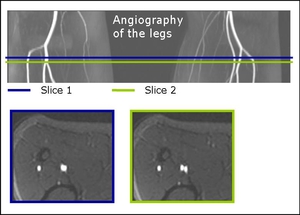
Topic 8: Slicewise update of k-space parts for angiography
Motivation:
Visualization of the vessel tree in the legs is used in the diagnosis of many vascular diseases, but it takes quite a long time (>10 minutes for a small part of the legs!) The amount of new information from one slice to the next is extremely small in angiography.
Idea: Instead of updating the whole k-space; only parts are updated in order to save time
Tasks:
-
Literature study: angiography & keyhole techniques
Experiments & Evaluation:
Where in k-space is the new information relevant for the vessels?
How far can I go, how much data is really needed?
Implementation: (Loading of angiographic slicedata is already implemented in the framework)
Loading of old data into the new k-space data from the MR scanner
Intelligent combination of old and new data parts
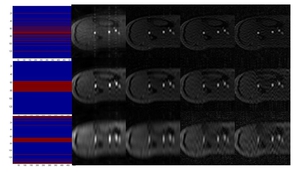
Topic 9: Measure for vesselness
Motivation:
To find a good sampling pattern for angiography experiments have to be compared regarding their capability to show the vessels
Visual evaluation is not sufficient, a computational measure is needed
Tasks:
- Literature study: angiography & vesselness measures
Experiments & Evaluation:
How can a vessel be analysed based on the medical image? (sharpness, size, borders,…)
Which characteristics of the vessel representation are important for the clinical evaluation?
Implementation: (Sampling pattern generator & reconstruction are provided)
Comparison possibility for different experiments
Different measures to detect and qualify vessels
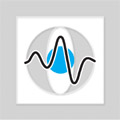

 +49-9131-85-27775
+49-9131-85-27775
 +49-9131-85-27270
+49-9131-85-27270
